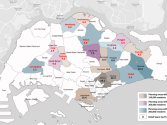
CNY depreciation feared to drag Hong Kong banks' profitability
NIMs will be badly affected.
The recent depreciation of the Chinese yuan could have a drag on Hong Kong banks' profitability, growth and asset quality, says Fitch Ratings. Rising offshore yuan (CNH) funding costs and a shortage in offshore yuan liquidity will have a negative effect on net interest margins (NIMs).
At the same time, the slowing Chinese economy will dampen demand for Hong Kong banks' cross-border lending, while the reduced yuan exchange rate weakens the repayment capacity of mainland borrowers in US dollar or Hong Kong dollar terms.
Here's more from Fitch Ratings:
Data is not yet out on the impact on Hong Kong deposits from the almost 4% decline in the CNH/USD exchange rate in August. However, any expectations for the currency to further depreciate against the USD are likely to exacerbate the trend of depositors converting their offshore yuan assets into other foreign currencies. Outstanding offshore yuan deposits had declined by 1% over the first seven months of the year, according to the Hong Kong Monetary Authority.
This decline has already contributed to tightening NIMs with Fitch-rated Hong Kong banks' weighted average NIM contracting to 1.54% at end-1H15 from 1.69% at end-2014. Offshore yuan funding costs have risen markedly alongside the decline in deposits, with Hong Kong banks raising short-term offshore yuan deposit rates to around 4% from 3%.
Profitability will also be affected as Hong Kong banks' offshore yuan-related business is dampened. Demand for investment products, insurance products and bonds denominated in offshore yuan is likely to have already weakened.
A weaker yuan will also extend the decline in Hong Kong banks' gross mainland China exposure as lending growth falters. Hong Kong banks' China exposure fell to 30.7% of assets at end-1Q15 from 32.7% at end-2014. Demand for cross-border lending has been partly driven by mainland companies' arbitrage activities rooted in firms' expectations for further yuan appreciation. The weaker repayment capacity of mainland borrowers in US dollar terms could also affect asset quality in cross-border lending, though the impact is likely to be minimal if there is no further sharp depreciation.
There will also be indirect effects on Hong Kong banks' lending. Hong Kong's wholesale and retail sector, which relies heavily on mainland consumption, has already come under pressure and is likely to slow down further. The outstanding loan balance in the wholesale and retail sector decreased by 1% over 1H15 to 6.1% of total loans, signaling a rapid deceleration from growth of 13% and 18% in 2014 and 2013, respectively. More broadly, the Hong Kong dollar's strength relative to the yuan will feed through to the economy via lower exports, reduced tourist receipts and weaker retail sales.
At its core, the recent yuan depreciation underscores Hong Kong banks' sensitivity to both the mainland economy and banking system. That said, the level of depreciation was relatively small and the effects, while widespread, should be manageable. Further yuan depreciation will accentuate the impact on profitability and growth






















 Advertise
Advertise








